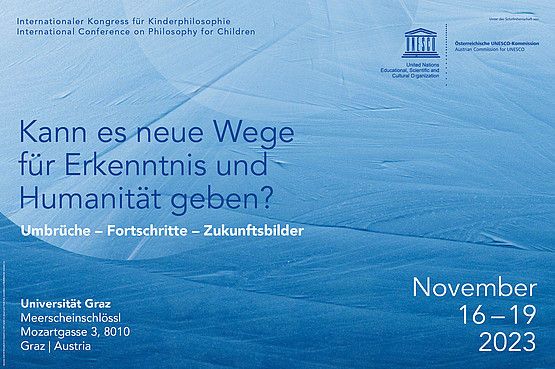International Conference 2023
International Congress for Children's Philosophy
"Can there be new paths for knowledge and humanity?" Upheavals - Progress - Images of the Future

November 16-18, 2023, Karl Franzens University Meerscheinschlössl, Mozartgasse 3, 8010 Graz/ Austria.
Our society is undergoing constant change. We are experiencing rapid transformations concerning the new composition of society, artificial intelligence (AI), the future of education, political decisions, or "unforeseeable" disasters, which increasingly lead to significant changes. Currently, we are predominantly confronted with a change stemming from the consequences of warlike conflicts - warlike excesses that have diminished hopes for a new peaceful world.
The unchecked climate change has immediate consequences, and its catastrophic effects will continue to intensify over time. Above all, existing inequalities among people are growing, thus endangering the social cohesion of current and future generations.
Pandemics, wars, energy shortages, democracy crises, and inflation: Events are unfolding rapidly, leading to a convergence of various crises, which often highlight what is not working.
What crises mean for people has always occupied thinkers. New attitudes, political decisions or unforeseeable catastrophes are often triggers for change. Change can be the engine of progress, crises literally force societies to take new paths.
It is necessary to reinterpret the classical ideal of enlightenment of antique origin, which since Plato and Socrates considers virtue and rationality as intertwined and here at the same time to make empirically adequate and practical, the necessary tools of philosophical-rational argumentation competence experienceable. The task of philosophy is thus to make connections argumentatively, linguistically comprehensible and to make possible solutions visible in the philosophical process of "bringing forth".
The beginning of the 21st century shows how transformative change is taking place in the internal-external relation between individuals and society. Densifications and spreadings of present societies develop cumulative shaping processes and want to be both dependent and independent - natural identities and sociopolitical identities are in suspense.
The increase in complexity leads to heightened certainties and uncertainties, couplings and decouplings, thus enabling a rational change due to the underlying democratization and enlightenment movement. A philosophically rational and scientifically rational reflection on the increasingly complex relations is therefore more urgent than ever. It is fundamentally about an epistemological-ethical design of renewed forms of rationality in the sense of coping with the future, for better analytical and empirical penetration.
Deeper philosophical analyses or reflections are necessary to work out possibilities and chances, to formulate the image of man in flux in a reflective and action-relevant way. It is about the viable correlations of the individual images of people and their society, especially in relation to a "new self-understanding" and "understanding of each other" and about under which "new" conditions "integration and inclusion" with "degeneration and exclusion" and on higher levels of meaningfulness "provision and securing existence" represent specific processes.
How well can philosophy capture the present? What approaches are there that give hope? How can transformation in education succeed along fundamental values such as freedom, justice and equality? What does a realization of sustainable educational work for all presuppose? What possibilities does philosophy offer to support society in these processes of change?
Philosophizing with children and teenagers can be seen as a significant impetus for a new positive focus on sustainable educational intentions since it contributes to the promotion of perceptual, interpretative, argumentative, dialogue, critical reflection, and judgment skills and, due to the "enlightenment-oriented" understanding between science and everyday life, can mediate and strengthen reflexive potential.
The congress is planned as an inter- and transcultural forum to enable philosophical discussions on current phenomena and to connect with other scientific disciplines, promote mutual exchange, and present new approaches to enable knowledge foundations and thought stimuli for concept developments in the field of education and philosophy.
Focal points of the congress include the following themes:
- Knowledge and Humanity
- Human rights and democracy
- Individuals and Society in Transformative Change
- Certainty and Uncertainty
- Community of Inquiry (Research Community)
- New Forms of Rationality
- Digital Change and Ethics
- Connections between Communication and Ways of Life
- Inter- and Transdisciplinarity - Multiculturalism
- Philosophical perspectives and Education
- Self-organization
- Peace as a Philosophical Challenge
You can find the program of the conference here.
More information about the Post Conference Workshop can be found here.
Registration and Information: Institute for Philosophy of Children and Youth Tel.: +43 (0)316 90370201 E-Mail: kinderphilosophie(at)aon.at E-Mail: office@kinderphilosophie.at Homepage: www.kinderphilosphie.at https://kinderphilosophie-gesellschaft.uni-graz.at/de/
